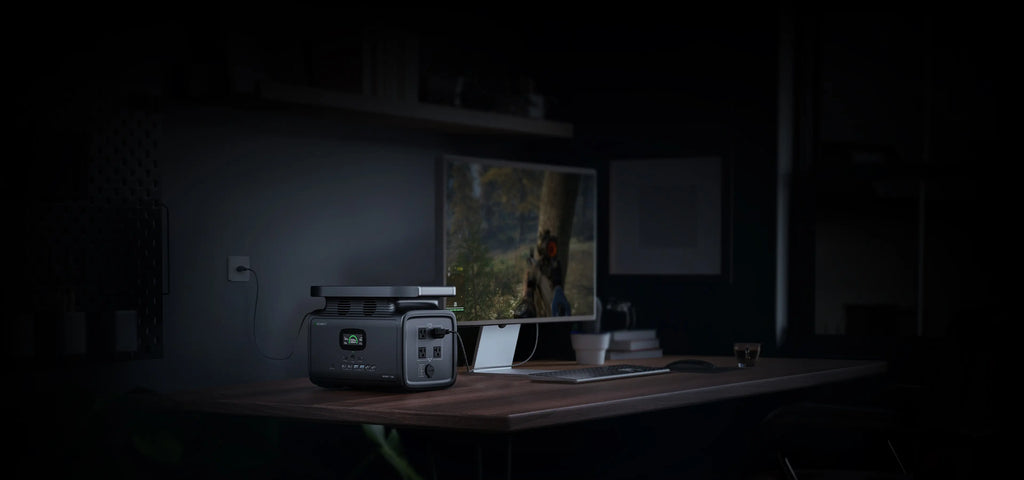Power solutions like battery backup systems and generators are valuable additions that will keep essential devices running in your household.
These two backup options are quite different in terms of their pricing, installation, operation, maintenance, and environmental impact.
If you’re considering backup power for your home but can’t find the right answer, you’re in the right place. In this comprehensive guide, we discuss key factors to consider when purchasing power backup solutions to simplify your decision-making.
To begin, let’s explore these two options.

What Is a Home Battery Backup?
A home battery backup system stores energy in batteries. You can draw from this storage solution to power your home and devices when other energy sources fail. These batteries are typically powered with electricity from the grid, but modern battery systems can be charged using solar panels, EV adaptors, and car adaptors.
Batteries are available in a variety of capacities to support different household needs. You can use them to power your most essential appliances or your entire home when needed.
Battery backup systems are commonly used to keep critical devices running during power outages.
Advantages of a Home Battery Backup System
- Requires little to no maintenance
- Noiseless
- Lasts up to 10 years
- Restores power immediately during an outage
- Highly efficient and reliable power supply for long periods
- Does not emit harmful fumes
- Gives you the option to add storage capacity
- Helps users save money on fuel costs
- Easily integrates with various renewable energy sources
Disadvantages of Home Battery Backup Systems
- High initial cost
- Limited power supply capacity
- Battery must be charged again after every use
- Professional support is needed to connect to the home’s electrical system
- Sensitive to extreme temperatures
- Relatively limited lifespan

What Is a Home Generator?
A home generator is a power backup solution that generates energy whenever required. Unlike battery systems, generators cannot store power. Instead, they produce energy using fuel—usually natural gas, diesel, or propane.
Unless a generator is connected to your home’s electrical system, it will take quite some time to start up after an outage.
Advantages of a Home Generator
- Generates its own energy
- Provides a high power output (can power more appliances for longer)
- Kicks on automatically during power outages
- Extremely reliable
- Adds value to the home
Disadvantages of a Home Generator
- Requires fuel to run (harder to source during emergencies and natural disasters)
- Expensive to run
- Some can take quite a while to start up
- Installation takes considerable time and expertise
- Often noisy
- Emits harmful fumes
- Regular fueling, testing, and maintenance required
- Takes up space outside the house

Battery Backup vs. Generator: Comparing Key Factors
The most practical and efficient power backup solution for your home depends on various factors, including your power consumption needs, appliances, budget, etc.
Here is a quick look at important elements to consider when comparing battery backup vs. generator:
1) Energy Source
Some homeowners prefer to use batteries for backup because they prefer renewable power sources. Generators rely on fossil fuels, which are quite expensive and can be difficult to source during natural disasters or emergencies.
2) Environmental Impact
When generators use fossil fuels to provide power, they end up emitting harmful fumes, which puts your health at risk and pollutes the air.
Battery backup systems do not produce any emissions and hence have a more positive environmental impact.
3) Noise
A generator, even if it’s outside the house, is quite noisy, which can be a considerable disturbance. If you want to keep noise pollution low, battery backup systems are the best option.
4) Lifespan
On average, generators can run for 5 to 15 years, after which their efficiency decreases. High-quality battery backups can run optimally for 20 to 30 years when used intermittently.
5) Maintenance and Durability
A battery backup system is a dream solution as it requires very little maintenance to continue functioning optimally for years. This makes them relatively more durable than a backup generator.
Since a generator has more moving parts, it needs regular maintenance and proper care for long-term use. Poor upkeep can also lead to damage, and they already have a shorter lifespan.
6) Power Load or Supply Capacity
The amount of power needed to keep a household running during blackouts is very different depending on the size of the family and the appliances in use. Batteries have a lower power capacity compared to generators. Since batteries can only store energy, their power supply will be limited and won’t last through consecutive days of a blackout. You will also be required to balance the critical loads for all appliances you need to run.
Generators are great for long periods—they can keep running as long as there is fuel. Plus, you don’t need to recharge a generator like you would a battery. There’s no need to calculate critical loads, either.
7) Price
Battery backup systems have a higher upfront cost than generators. Most American medium-sized homes need to install more than one battery to run multiple appliances during blackouts.
The average cost of a battery backup system for a medium-sized home is around $3,000 to $15,000. This also includes installation expenses and miscellaneous fees.
In contrast, generators involve a lower initial investment of around $300 to $5,000. Note that they have a higher operating cost than battery backup systems as they run on fuel, the price of which continuously fluctuates.
Overall, generators are a more cost-effective solution for homeowners with limited budgets. But if your energy needs are low, a battery backup system may make more sense—the initial investment will be worth it due to long-term use.
8) Installation
Backup generators are more challenging to install than home battery backup systems. They require looking for an ample appropriate space to keep it, setting it in concrete, connecting a fuel line, and installing the transfer switch.
With battery backup systems, you typically only need to connect the battery to a power inlet box. In some cases, you may need to mount the system to the wall or floor and integrate it into your home’s existing wiring.

Battery Backup vs. Generator: Comparison Chart
|
|
Battery Backup Systems |
Generator Backup Systems |
|
Energy Source |
Electricity or renewable sources |
Fossil fuels |
|
Environmental Impact |
Minimal |
Air Pollution |
|
Noise |
No |
Loud |
|
Lifespan |
20 - 30 years |
5 - 15 years |
|
Maintenance and Durability |
Durable with minimal maintenance |
Durable with lots of maintenance |
|
Power Load or Supply Capacity |
Low capacity |
Unlimited capacity with ample fuel |
|
Price |
$3,000 - $15,000 for an average medium-sized home |
$300 - $5,000 |
|
Installation |
Easy and quick |
Takes quite a bit of effort, time, and expertise |
Is There an All-In-One Battery Backup Generator?
There are enough reasons to go for a battery backup system or a generator and enough disadvantages to choose neither.
If you wish there was a power backup solution that combined the best features from both batteries and generators, try going for solar generators.
Solar generators, or battery backup generators, produce energy by harnessing sunlight. They require no fuel to run. And because sunlight is a renewable energy source, the power generated is clean and sustainable.
Whether you face a natural disaster or an emergency, as long as there is sunlight, your solar generator can keep producing power.
Some cutting-edge solar generators even take it up a notch in functionality with top-notch, practical features that are practical and incredibly efficient. Here is a look at some of the best offerings of advanced solar generators like Growatt INFINITY 1300.
Growatt INFINITY 1300
Some solar generators like the INFINITY 1300 can power up using energy from the grid. They’re an efficient energy backup solution for anyone looking for a cost-effective power source that’s also sustainable.
The INFINITY 1300 takes only 2.5 hours for a full charge by solar panels and will resume your power supply in as little as 20 milliseconds when sudden blackouts occur. Within that instant, the battery achieves its 1382Wh capacity.
Its 1800W output means you can easily power up various small and heavy-duty devices and appliances without worry. It also has a built-in Battery Management System (BMS) to keep your devices safe and minimize the risk of overload, short circuits, etc. Its LiFePO4 battery ensures the battery solar generator continues running for a long time (over 3,000 cycles).
You can use the INFINITY 1300 to power your entire home or any of your appliances or devices through its 14 outlets.
The best part is that you can control the rechargeable generator wirelessly through an app on your mobile device.
To Sum It Up
Battery backup systems and generators mean you don’t have to worry about losing power in your home. Battery systems can power multiple appliances sustainably, whereas backup generators allow you to run larger power loads for extended periods.
We hope this guide has helped illuminate the battery backup vs. generator debate for you. And if you want the benefits of both, consider getting a battery solar generator.
Whatever you choose, make sure to consider your needs and perform thorough research for each product using our guide!






